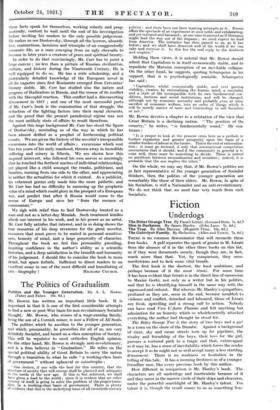The Politics of Gradualism
Politics and the Younger Generation. By A. L. Rowse. (Faber and Faber. 10s. 6d.)
M. ROWSE has written an important little book. It is important in that it is one of the first considerable attempts to find a new or post-War basis for non-revolutionary Socialist thought. Mr. Rowse, who comes of a wage-earning family, being the son of a Cornish miner, is now a Fellow of All Souls.
The politics which he ascribes to the younger generation, and which, presumably, he prescribes for all of us, are very definitely Socialist, and based on a class conception of Society.
This will be repulsive to most orthodox English opinion. On the other hand, Mr. Rowse is strongly anti-revolutionary, and is a firm believer in " Gradualism." He relies on the special political ability of Great Britain to carry the nation through a transition to what he calls " a working-class basis of government " without upheaval or catastrophe :
" One desires, if one wills the best for this country, that the structure of society that will emerge shall be planned and adequate to the needs of the new age. If this is but achieved, we shall have given a lead to the world ; since it is evident that no other country of itself is going to solve the problem of the proper trans- ition to a working-class basis of government. There is plenty of evidence that this is the underlying issue of all twentieth-century
politics ; and there have not been wanting attempts at it. Russia offers the spectacle of an experiment at once noble and exhilarating, and yet tortured and harassed • at one time it seemed as if Germany might lead the way out of the impasse ; we need expect no lead from America. The initiative has then passed to us, as it has before ; and we shall have deserved well of the world if we can take and exercise it. In this lies the real reply to the doubters and sceptics."
Holding these views, it is natural that Mr. Rowse should admit that Capitalism is in itself economically stable, and to repudiate the Marxian conception of an inevitable collapse. On the other hand, he suggests, quoting Schumpeter in his support, that it is psychologically unstable. Schumpeter has said :
" Capitalism, whilst economically stable, and ever gaining stability, creates, by rationalizing the human mind, a mentalit3 and a style of life incompatible with its own fundamental con• ditions, motives and social institutions, and will be changed, although not by economic necessity and probably, even at some sacrifice of economic welfare, into an order of thing; which it will be merely matter of taste and terminology to call Socialism or not."
Mr. Rowse devotes a chapter to a refutation of the view that Great Britain is a declining nation. " The position of the country," he writes, " is fundamentally sound." He con- tinues :
" It is proper to look at the present crisis here as a prelude to further expansion and greater prosperity upon the basis of a smaller burden of labour in the future. This is the end of rationaliza- tion ; it must go forward, if only that international competition necessitates that it should; and if the community in general is to exist well, there must be something to divide. There is indeed no antithesis between rationalization and socialism ; indeed, it is probable that the one implies the other."
On the whole, we may say that, if Mr. Rowse's politics are in fact representative of the younger generation of Socialist thinkers, then the politics of the younger generation are remarkably like those of their elders. Mr. Rowse, in spite of his Socialism, is still a Nationalist and an anti-revolutionary. We do not think that we need fear very much from such Socialists.














































 Previous page
Previous page